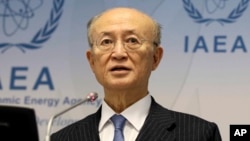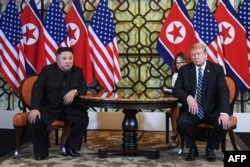The United Nations atomic watchdog said on Tuesday that if a deal was reached with North Korea to give up its nuclear program then it would be ready to send in inspectors within weeks — if asked — to verify and monitor denuclearization.
International Atomic Energy Agency (IAEA) Director-General Yukiya Amano told the U.N. Security Council that the IAEA was the only international organization equipped to carry out the job "in an impartial, independent and objective manner."
"Subject to the approval of our Board of Governors, we could respond within weeks to any request to send inspectors back to the DPRK," he told the 15-member council during a meeting on the Non-Proliferation Treaty. The official name of North Korea is the Democratic People's Republic of Korea.
U.S. President Donald Trump and North Korean leader Kim Jong Un have met twice in the past year to discuss denuclearization.
North Korea is under tough U.N. Security Council sanctions that have been steadily tightened since 2006 to choke off funding for Pyongyang's nuclear and ballistic missile programs.
Trump and Kim last met in Vietnam in February, but the summit was cut short after they failed to reach a deal on the extent of economic sanctions relief for North Korea in exchange for steps to give up its nuclear program.
On the day that their talks in Hanoi collapsed, Trump handed Kim a piece of paper that included a blunt call for the transfer of Pyongyang's nuclear weapons and bomb fuel to the United States, according to the document seen by Reuters.
The Vienna-based International Atomic Energy Agency has not had access to North Korea since Pyongyang expelled its inspectors in 2009, and it now monitors the country's nuclear activities mainly through satellite imagery.
Amano said that sending in IAEA inspectors "would help to make the implementation of any agreement sustainable."
"It would also contribute to the denuclearization of the DPRK in a complete, verifiable and irreversible manner, as required by numerous resolutions of the Security Council," he said.
The IAEA already monitors the implementation of a 2015 deal between Iran and world powers to curb its nuclear program. Trump withdrew the United States from the deal with Iran in May 2018.
"Our inspectors have had access to all the sites and locations in Iran which they needed to visit," Amano said.
Separately, the South Korean defense minister told reporters in Washington that it was too early to tell whether activity near the Dongchang-ri site in North Korea was preparation for an actual missile launch or was just to "add another card" in Pyongyang's negotiation strategy.
Last month, South Korean intelligence agencies said they had detected signs that North Korea was restoring part of the Dongchang-ri missile launch site it tore down.






